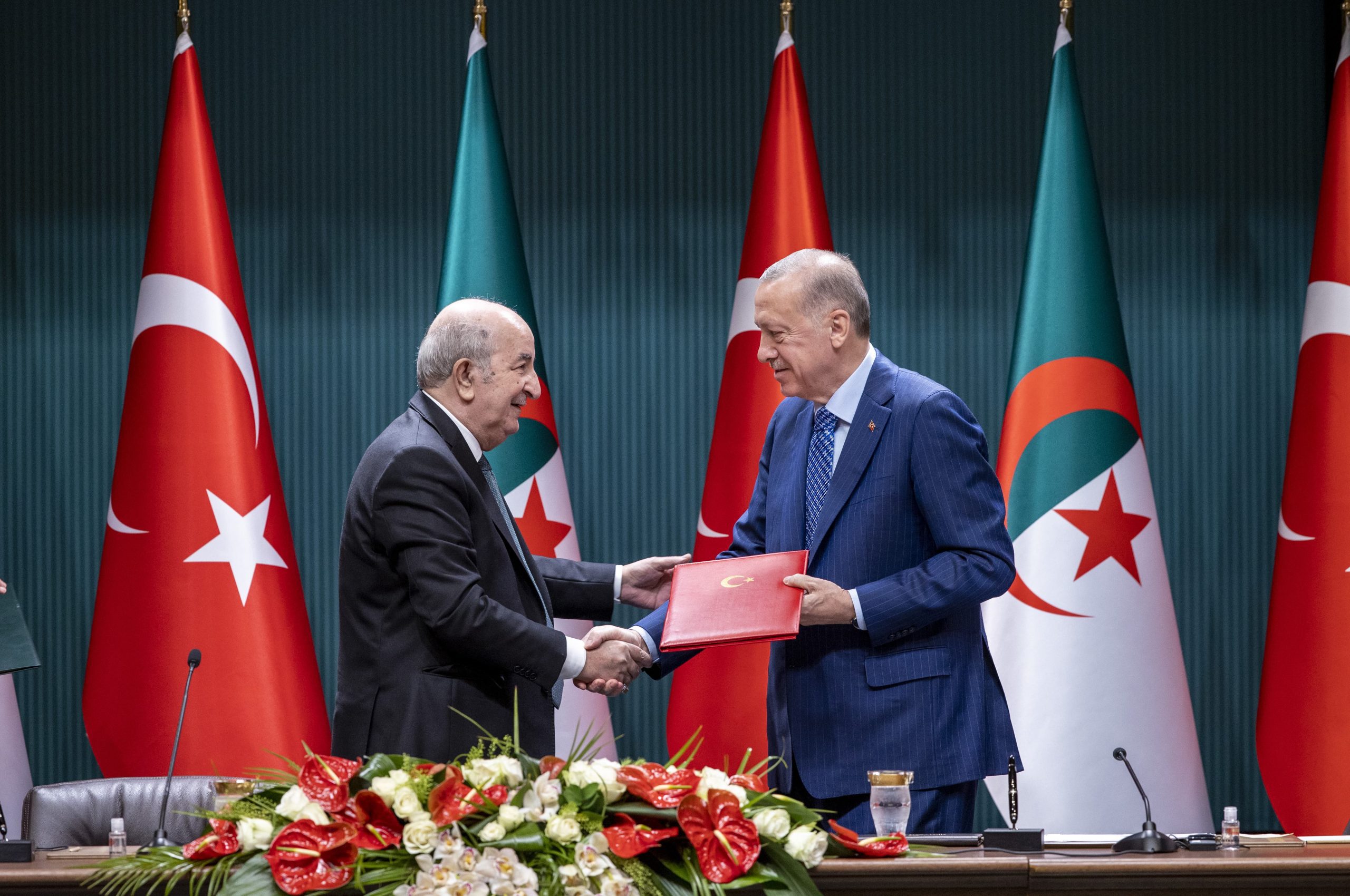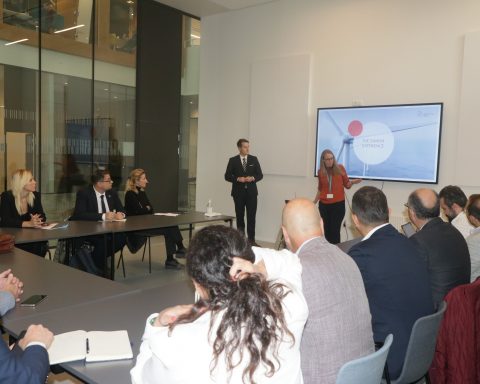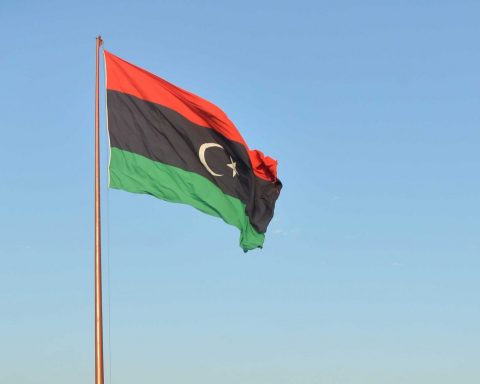Turkish-Algerian relations have reached favorable conditions, strengthening through institutionalized comprehensive dialogue and framework. Last month, Algerian President Abdelmadjid Tebboune conducted his first state visit to Türkiye, in which his visit fortified the historic relations between the two countries. In a time of change in world affairs triggered by the impacts of COVID-19 and the ongoing Russia-Ukraine war, two geopolitical determinants are pushing Türkiye and Algeria to reset their foreign policy paradigms, thus promoting the expansion and diversification of bilateral trade and investments, and creating a strategic axis on the eve of Algeria’s sixtieth anniversary of its independence from France in 1962.
A milestone commemoration coincides with the sixtieth anniversary of both countries’ diplomatic ties. Consequently, last month, President Tebboune’s state visit to Türkiye came seventeen years after a similar visit by the late President Abdelaziz Bouteflika: a visit that set the past and future parameters of bilateral relations. For the two countries’ populations, the relations are deep and goes back to the time of the Ottomans in the sixteenth century, when they closed cultural, political, economic and geopolitical connections.
Today, all these factors have become the backbone of the building strategic rapprochement between Ankara and Algiers.
The roadway to Africa
In recent years, Africa has attracted new regional and global actors such as China, Türkiye, Saudi Arabia, Qatar, the United Arab Emirates, and even Iran, due to its growing markets, vast natural resources, and geostrategic location. Both countries have set an active Africa policy in their respective foreign policy objectives based on strategic cooperation and a win-win approach with the African nations. Ankara’s Africa policy has been active since the first visit of Turkish President Recep Tayyip Erdoğan to war-torn Somalia in 2012. It was the first visit by a foreign leader in two decades. Recent geopolitical events that are shaping the African Sahel and West Africa, in general, have increased Ankara’s position to be a solid player in the dynamic balance of power in the old equation set by Paris, which sees the region as its eternal backyard.
While French anti-sentiment is on the rise in the African Sahel countries, notably in Mali, which obliged French President Emmanuel Macron to end France’s military operation last spring, Operation Barkhane, a military operation launched by his predecessor Francois Hollande in 2014, was supported along with the EU military task force mission to Takuba.
A causality effect that had created a political and geopolitical power vacuum was filled quickly by Wagner mercenary forces who are using their presence in Libya as a rear base to operate in the African Sahel countries. Algiers, however, is playing a major role in the political reconciliation process based on the 2015 Algiers Agreement. From Algiers’ perspective, a stable African Sahel means a stable Tunisia and Libya from a national security strategy perspective. Like Ankara, it does not want to see Libya, for example, turn into a militia state or Tunisia become a failed state.
In this stance, Ankara has been working on a mission to stabilize Libya since 2019, after which Türkiye and the then-Government of National Accord (GNA) of Libya signed a maritime boundary treaty in order to establish an exclusive strategic economic zone in the Mediterranean Sea. This began a trend with multi-dimensional investments that Türkiye has implemented in Libya, which opened up the African Sahel and eventually West Africa’s roadways for Ankara.
This makes both countries a sustainable regional stabilizing force in Africa. Two strategies put in place by the people and a new generation of elites in Africa are endorsing Türkiye and Algeria’s active foreign policies in Mali and Chad. Even political and military leaders are welcoming the role played by the countries in the African continent. Algiers has been playing an active role in the African Union on conflict resolutions between African neighboring countries, offering mediation on the ongoing issue of GERD between Ethiopia, Sudan, and Egypt.
On the other hand, Ankara’s humanitarian diplomacy was a working form of public diplomacy that did pave the road for military and security assistance for many African countries, starting in Somalia and Libya. A foreign policy imperative allowed Ankara to impose itself on the continent not only with soft power means but also with hard power means among global and regional powers like China, Russia, France, and the UK. African countries today look at Türkiye as a trustworthy partner even in military equipment and assistance, with Türkiye’s efficient unmanned combat plane, the Bayraktar TB2, that is shifting the entire aerial combat doctrine, standing out in particular.
The Mediterranean gate
The fifteen bilateral agreements and MoUs signed between the two countries’ leaders last month in Ankara put the relations between the two Mediterranean states in a new posture that both countries’ leaders want to fulfill. Algeria has always been a naval fortress for Türkiye, a view that is shared today by the Algerian military authorities and President Tebboune, who are re-establishing new maritime borders with Italy and Spain. The Algerian authorities want to position Algeria as a rising state in the Mediterranean.
The redrawing of the maritime borders of Algeria is well received in Algiers, a narrative of national pride that sets back the time of the heroic role of the Barbaros brothers and Hamidou Ben Ali, known by his alias Raïs Hamidou, in the Mediterranean basin. Today, Türkiye is also enhancing its new maritime strategy called Mavi Vatan (Blue Nation). Like their Algerian counterparts, the Turkish military and political leaders are concerned about their country’s national security elements on their maritime borders. They realize that the importance of the Mediterranean Sea in today’s world affairs is as it was three centuries ago.
A strategy that ensures both countries’ domestic and regional stability is needed, where Türkiye is already positioning itself as a stabilizing force in the Mediterranean as it goes into the Black Sea in light of the ongoing Russia-Ukraine war.
Thus, Algeria’s new foreign policy doctrine, which is based on non-alignment and diversification of partnership, matches with Türkiye’s pragmatic and realistic foreign policy approach that leaves Ankara to weigh heavily on the new regional order and eventually on the new world order that is emerging from the Russia-Ukraine war’s ramifications. As a result, the two countries today are on the trajectory of a favorable regional sphere of influence. Both countries were pushed aside for decades by western regional powers such as France and Italy. Interestingly, both countries have cold relations with the former and warm ties with the latter.
The usual suspects
Does the new Ankara-Algiers axis intrude on Paris? Most certainly in the case of Algeria, knowing Algiers just established a new strategic axis with Rome, where it opens up opportunities for geo-economic cooperation between Algiers and Rome in the same way that it does between Ankara and Algiers.
Paris, however, in its foreign policy fiasco under President Macron’s first term, did consolidate Ankara’s position on vital regional issues, whether in the Eastern Mediterranean, the Maghreb, or the African Sahel regions. It is a failure that Algiers enjoys in order to be relatively able to free itself from French influence and its lobby domestically.
In sum, qualitative relations between Ankara and Algiers would have a positive impact on Algeria’s domestic politics and new economic choices, with Algerian authorities, implicitly taking the Turkish democratic process that is making healthy progress in Türkiye into consideration. Algeria, like Türkiye, has an old tradition of a powerful military institution that has a major say in domestic politics and foreign policy orientations. Yet, the arrival of the AK Party to power in 2002 in Türkiye changed the political perception of the center-right Islamists, whose political identity is a mix of nationalism and religious conservatism led by a pragmatist leader.













